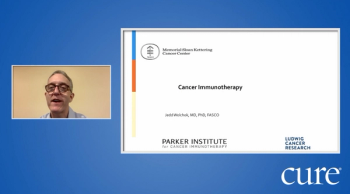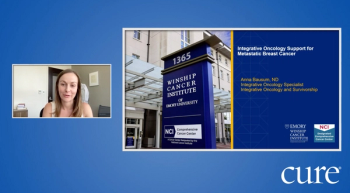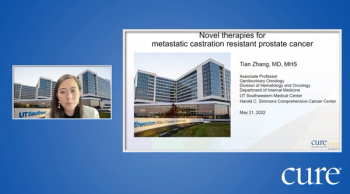
Watch Dr. Farhad Mazdisnian, Dr. Terence Williams and Dr. Antoinette J. Wozniak answer questions about the basics of the disease during the CURE Educated Patient Lung Cancer Summit.

Watch Dr. Farhad Mazdisnian, Dr. Terence Williams and Dr. Antoinette J. Wozniak answer questions about the basics of the disease during the CURE Educated Patient Lung Cancer Summit.

Watch Dr. Terrance M. Williams, from City of Hope, discuss radiation advances during the CURE Educated Patient Lung Cancer Summit.

Watch Dr. Farhard Mazdisnian, from City of Hope, discuss diagnosing early, locally advanced and metastatic disease, during the CURE Educated Patient Lung Cancer Summit.

Watch Dr. Jedd D. Wolchok, Lorenzo Cohen, Dr. Anna C. Pavlick and Julie Bain answer questions about treating skin cancer, during the CURE Educated Patient Skin Cancer Summit.

Watch Dr. Anna C. Pavlick, from Weill Cornell Medicine, discuss clinical trials during the CURE Educated Patient Skin Cancer Summit.

Watch Lorenzo G. Cohen, from The University of Texas MD Anderson Cancer Center, discuss integrative care during the CURE Educated Patient Skin Cancer Summit.

Watch Dr. Jedd D. Wolchok, from Memorial Sloan Kettering Cancer Center, discuss immunotherapy, during the CURE Educated Patient Skin Cancer Summit.

Watch Dr. Sherrif Ibrahim, Dr. Erica B. Friedman and Dr. Nicholas Sanfilippo answer questions about the multidisciplinary approach to care during the CURE Educated Patient Skin Cancer Summit.

Watch Dr. Nicholas Sanfilippo, from Weill Cornell Medicine, discuss radiation therapy options during the CURE Educated Patient Skin Cancer Summit.

Watch Dr. Erica B. Friedman, from NYU Grossman School of Medicine, discuss surgery, during the CURE Educated Patient Skin Cancer Summit.

Watch Dr. Sherrif Ibrahim, from the University of Rochester Medical Center, discuss topical treatments during the CURE Educated Patient Skin Cancer Summit.

Watch Dr. Barbara Ma, Dr. Evan Lipson, Dr. Sunandana Chandra and Samantha Guild answer questions on the basics of skin cancer and melanoma during the CURE Educated Patient Skin Cancer Summit.

Watch Dr. Sunandan Chandra, from Northwestern University Feinberg School of Medicine, discuss the basics of melanoma, during the CURE Educated Patient Skin Cancer Summit.

Watch Dr. Evan J. Lipson, from Johns Hopkins Medicine, discuss Merkel cell carcinoma, during the CURE Educated Patient Skin Cancer Summit.

Watch Dr. Barbara Ma, from Weill Cornell Medicine, discuss the basics of basal and squamous cell carcinomas during the CURE Educated Patient Skin Cancer Summit.

Watch Emily Huskey, Dr. Wendy Baer, Fabienne Ehivet and Lisa Weems answer questions about areas outside of treatment during the CURE Educated Patient Metastatic Breast Cancer Summit.

Watch Fabienne Ehivet, from Emory Saint Joseph’s Hospital, discuss genetic testing, during the CURE Educated Patient Metastatic Breast Cancer Summit.

Watch Dr. Wendy Baer, from Winship Cancer Institute at Emory University, discuss psychosocial issues, during the CURE Educated Patient Metastatic Breast Cancer Summit.

Watch Emily Huskey, from the Winship Cancer Institute of Emory University, discuss diet and exercise, during the CURE Educated Patient Metastatic Breast Cancer Summit.

Watch Dr. Kimberly Curseen, Dr. Anna Bausum, Dr. Kevin Kalinsky and Alyncia Mason answer questions about additional care, during the CURE Educated Patient Metastatic Breast Cancer Summit.

Watch Dr. Kevin Kalinsky, from Winship Cancer Institute of Emory University, discuss joining clinical trials, during the CURE Educated Patient Metastatic Breast Cancer Summit.

Watch Dr. Anna Bausum, Winship Cancer Institute at Emroy University, discuss alternative medicine, during the CURE Educated Patient Metastatic Breast Cancer Summit.

Watch Dr. Kimberly Curseen, from Winship Cancer Institute of Emory University, discuss supportive care, during the CURE Educated Patient Metastatic Breast Cancer Summit.

Watch Dr. Suchita Pakkala, Dr. Jane Meisel, Dr. Keerthi Gogineni and Kelly Shanahan discuss updates in disease management during the CURE Educated Patient Metastatic Breast Cancer Summit.

Watch Dr. Suchita Pakkala, from Emory University School of Medicine, discuss estrogen receptor-positive disease, during the CURE Educated Patient Metastatic Breast Cancer Summit.

Watch Dr. Jeremie Calais, Dr. Tian Zhang, Dr. Landon C. Brown and Jim Rosenfield answer questions about novel agents and strategies during the CURE Educated Patient Prostate Cancer Summit.

Watch Dr. Landon C. Brown, from Atrium Health Levine Cancer Institute, discuss approaches to hormone therapy, during the CURE Educated Patient Prostate Cancer Summit.

Watch Dr. Tian Zhang, from UT Southwestern Medical Center, discuss novel agents, during the CURE Educated Patient Prostate Cancer Summit.

Watch Dr. Jeremie Calais, from UCLA, discuss novel imaging strategies, during the CURE Educated Patient Prostate Cancer Summit.

Treatment with Venclexta plus Gazyva, with or without Imbruvica, led to better outcomes than chemoimmunotherapy in patients with chronic lymphocytic leukemia.